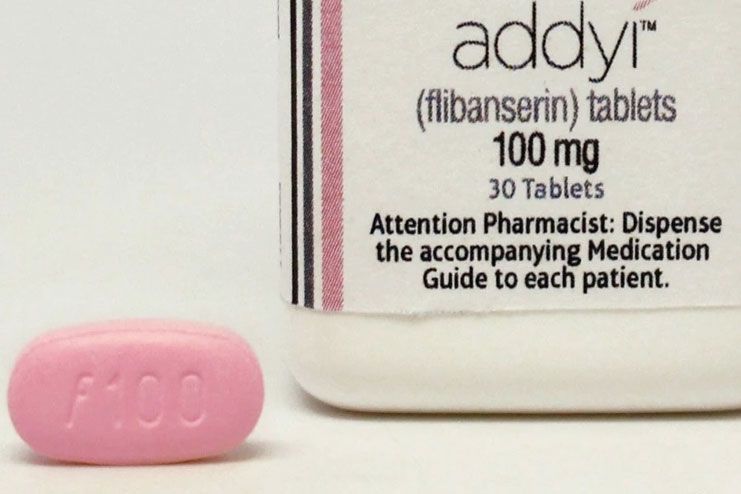Affiliate Disclaimer
Some links in this article are affiliate links. We may earn a small commission if you make a purchase through these links, at no extra cost to you. We only recommend products we find useful to our readersSexual health is a key part of your overall health. Impotence and sexual dysfunction can equally affect both men and women. However, most female sexual dysfunction cases remain hush hush! Not any more! Learn more about female impotence and do not hesitate to seek help.
What Is Female Sexual Dysfunction?
Female sexual dysfunction is the disruption of any of the components that affect sexual arousal, desire, or satisfaction. A complex combination of emotions, beliefs, experiences, physiology , lifestyle, and relationships is involved in the sexual response. Disruption to any of these components may lead to female sexual dysfunction.
Many women face female sexual dysfunction at some point or the other during life. This medical condition can occur at any stage of life, in any sexual situation. It may remain lifelong or can be acquired.
What Are The Types And Symptoms Of Female Impotence?
Symptoms of female sexual dysfunction can be manifested based on the types of female impotence as low sexual desire (lack of interest or willingness in sex), orgasmic disorder (recurrent or persistent difficulty in achieving orgasm following arousal and stimulation), sexual arousal disorder (problem with getting aroused or maintaining arousal during the sexual activity), sexual pain disorder (pain associated with vaginal contact or sexual stimulation). These can be further broadly classified as:
Hypoactive sexual desire disorder – Recurring deficiency or absence of sexual desire.
Sexual aversion disorder – Recurring aversive response to genital contact with partner
Arousal disorder – Inability to complete sexual activity with adequate lubrication
Primary orgasmic disorder – Never having the ability to achieve orgasm
Secondary orgasmic disorder – Inability to achieve orgasm generally as a result of another sexual dysfunction
Dyspareunia – Persistent or recurrent genital pain linked to sexual intercourse that is not caused due to insufficient lubrication virginiamus
What Causes Sexual Dysfunction In Women?
Numerous factors contribute to sexual dysfunction in women. In general, sexual issues arise when hormones in the female are at flux. Women who delivered a baby or in the menopause stage experience sexual dysfunction, usually. Additionally, major illness like diabetes, cancer, heart, blood vessel/cardiovascular diseases may also contribute to sexual dysfunction. Other factors that add up to sexual dysfunction or dissatisfaction include:

- Social and psychological factors like depression and anxiety can lead to female sexual dysfunction. Hence, untreated mental disorders like depression contribute to long-term sexual abuse and stress.
- Pressure or worries for getting mother, as well as demands of being a mother of newly born, also show similar effects.
- Clearly, conflicts with sexual partner about relationship or about sex do diminish sexual responsiveness in women.
- Many times, religious and cultural differences between the partners along with body image contribute to female sexual dysfunction.
- Financial commitments and drawbacks also add up to the condition.
- Long and heavy working hours or immense mental pressure at workplace can cause female impotence as well.
- Imperfect physical health or other medical conditions like kidney failure, cancer, heart diseases, multiple sclerosis, diabetes, bladder problems, or heart diseases may also contribute to female impotence.
- Some medications including blood pressure medications, antidepressants, chemotherapy drugs and antihistamines lead to decreased desire for sex or the ability to experience orgasm.
- Low estrogen levels following menopause can cause changes to sexual responsiveness, besides changes to genital tissues.
- Decrease in estrogen ends up with decreased blood flow to the pelvic region, thus requiring longer time for arousal or reach genital sensation and orgasm.
- Hormonal levels play during the period after the childbirth or lactation period. During theses phases, women experience vaginal dryness or lesser desire for sex.
- If a woman is not sexually active for a period of time, the vaginal lining may become thinner and losses elasticity which in turn causes sexual dysfunction or painful intercourse (dyspareunia).
- With decrease in hormonal levels for whatever may be the reason, sexual desire decreases.
If sex problems in women are affecting the relationships, it is not worth neglecting. The couple have to seek medical health. Take your doctor’s appointment for a thorough evaluation.
What Is The Treatment For Female Sexual Dysfunction?
The treatment for female sexual dysfunction involves more than one approach. Before starting the treatment, the doctor may talk to diagnose the actual problem and the history.
As a part of the diagnoses, your doctor would
- Examine for physical changes in the pelvic area like thinning of genital tissue, decrease in the elasticity, pain or scarring in the genital areas.
- Feel comfortable to share your sexual and medical history with your doctor as it is important for right diagnosis.
The more you reveal about your personal sexual health, the more are the chances for finding an effective approach to treat. You may also be referred to a therapist or counsellor or specialist in sexual and relationship problems.
Sexual problems of women are better addressed with a combined medical treatment as well as emotional and relationship issues.
Medical Treatment: As a part of medical treatment, the underlying hormonal change or medical condition has to be addressed. Flibanserin (Addyi) is a prescription medication for women in premenopausal state and with low sexual desire. This drug is originally developed as an antidepressant. The US Food and Drug Administration has approved Flibanserin (Addyi) as a treatment for low sexual desire in premenopausal women.
How Does Flibanserin (Addyi) Work?
Addyi pill (one a day) may boost sex drive in women. Side effects from the drug include nausea, low blood pressure, fatigue, sleepiness, fainting and dizziness. The side effects manifest, when taken in conjunction with alcohol.

As a part of the treatment, doctor might recommend for:
- Change or adjustment in medications with sexual side effects
- Treating other hormonal or thyroid problems
- Optimizing the treatment for anxiety and depression
- Exercises or strategies to relieve problems and pelvic pain
Other therapies for treating female sexual dysfunction linked to a hormonal problems include Androgen therapy and Estrogen therapy.
Androgen therapy includes Testosterone that plays role in healthy sexual functioning in humans, even though women have low testosterone levels.However, more research is required this area. Estrogen therapy is given as the localized therapy in the form of a vaginal cream, ring or tablet. This therapy works by improving the elasticity and the vaginal tone. It also helps increase vaginal blood flow and enhance lubrication.
Risks from hormone therapy: The risks may vary based on the estrogen levels and the hormone given with a progestin. Other factors that contribute to the risks associated with the hormone therapy include: age, hormone type, dosage and health issues.
Note: Talk in detail to your doctor about the risks and the side effects associated with the hormonal therapy or other treatments for sexual dysfunction in women. These therapies might require close monitoring.
Tips To Improve the Condition Of Sexual Dysfunction In Women
More of natural ways and home remedies can help improve or resolve the sex issues in women. Simple lifestyle changes may aid in improving the condition without much risks or associated-side effects.
- Nothing more effective than communication. Have an open communication with your partner. Talk and equally listen. Provide, receive feedback and attempt to make necessary adjustments and build greater intimacy.
- Healthy lifestyle plays are crucial role. Avoid alcohol and try to be physically active. Regular physical activity can greatly enhance stamina and elevate moods.
- Healthy lifestyle habits have been proven to enhance romantic emotions. Opt for ways to decrease stress and focus on enjoying health and happy sexual life.
- Many times counselling on sexual and relationship problems would turn effective. These therapies and counselings include sex education and ways to optimize the body’s sexual response as well as enhance intimacy with the partner.
- Natural vaginal lubricants can help with pain during sex and vaginal dryness during intercourse.
- Quit smoking. As smoking restricts blood flow all through the body and hence, less blood reaches the sexual organs. This results in decreased orgasmic response and sexual arousal.
- Aerobic exercises are known to enhance stamina and improve body image.
- Relaxation and leisure time are equally essential. Amid daily stressful life, ways to lessen stress and relaxation play a crucial role in improving sexual experiences.
- Practice meditation type known as mindfulness, which helps increase self awareness and acceptance of living in the moment. Focus on your breath while meditating. Studies reveal that mindfulness enhance sexual response and decreased personal distress in women.
- Acupuncture also helps improve moods. It involves the insertion of thin needles into skin at strategic points on your body, resulting in positive impact on the sexual dysfunction. Other workout like yoga and brisk walking also helps improve body’s overall health.
- Understand your body and learn the organs that contribute to sexual difficulties.Take necessary measures to ease the symptoms.
- Search for educational materials and learn to deal with issues that cause sexual problems like illness, aging, menopause, pregnancy, and medicines.
- Build intimacy and be flexible with your partner and engage in ways that are comfortable for both of you.

Can We Prevent Sexual Dysfunction In Women?
Prevention of sexual dysfunction in women can be achieved with proper lifestyles, habits, relation and overall well-being. Avoiding the risk factors of female impotence can help big time. Here is the overview of risk factors that increase the chances of sexual dysfunction in women. Avoiding these factors to the possible extent may help prevent sexual dysfunction in women.
- Mental stress
- Anxiety and depression
- Cardiovascular diseases
- Blood vessel diseases
- Neurological conditions
- Spinal cord injury
- Kidney or liver failure
- Medications for high blood pressure and antidepressants
- Psychological and emotional stress
- Previous history of sexual abuse.
In short, it is important to remember that sexual response has a lot to do with both your partner’s as well as your feelings and not just physical sexual stimuli. It is more important to discover each other every time you get intimate. Hence, sexual dysfunction in women is not to be neglected and has to be addressed readily for the benefit of overall well-being of both the partners.
In this Article
















